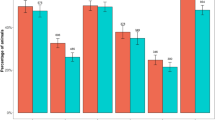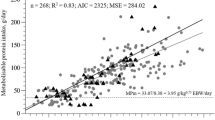Abstract
Elliott and Crichton1 claimed that ‘bent-leg’ is of widespread distribution in Scotland. They found that cod-liver oil added daily to the diet of young rams less than a year old prevented the appearance of the rachitic condition. These observations were confirmed by Auchinachie and Fraser2 and by Dunlop3. Recent experimental work by Ewer4 has shown that the rachitic condition occurring in Welsh lambs brought to Cambridge could be prevented by the administration of a single dose of vitamin D2 (25 mgm. calciferol in 10 ml. arachis oil) given orally to each animal. The protective action of this large dose lasted approximately two months.
This is a preview of subscription content, access via your institution
Access options
Subscribe to this journal
Receive 51 print issues and online access
$199.00 per year
only $3.90 per issue
Buy this article
- Purchase on SpringerLink
- Instant access to full article PDF
Prices may be subject to local taxes which are calculated during checkout
Similar content being viewed by others
References
Elliott, W., and Crichton, A., J. Agric. Sci., 16, 65 (1926).
Auchinachie, D. W., and Fraser, A. H. H., J. Agric. Sci., 22, 560 (1932).
Dunlop, G., Proc. Nutrit. Soc., 4, 69 (1946).
Ewer, T. K., Brit. J. Nutrit., 5, 287 (1951).
Author information
Authors and Affiliations
Rights and permissions
About this article
Cite this article
DUNLOP, G. Rickets in Sheep. Nature 173, 453 (1954). https://doi.org/10.1038/173453a0
Issue Date:
DOI: https://doi.org/10.1038/173453a0



